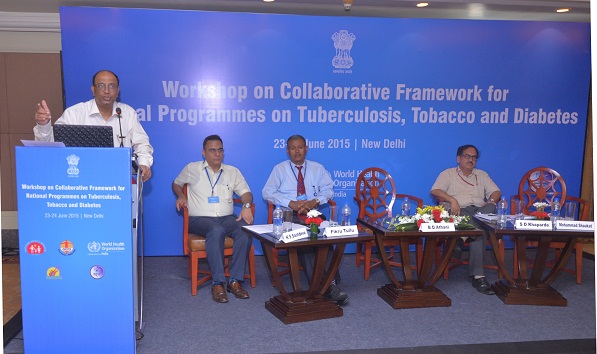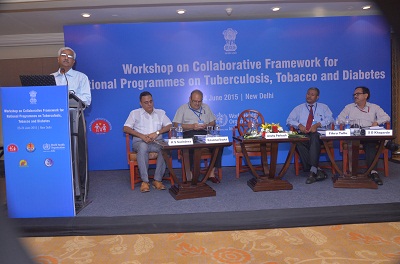
The World Health Organization in collaboration with the Ministry of Health & Family Welfare organized a National Workshop on the Collaborative Framework for National Programmes on Tuberculosis, Tobacco and Diabetes on 23-24 June 2015 in New Delhi. The workshop provided a platform to develop joint implementation strategies to address comorbidities of tuberculosis and noncommunicable diseases with a focus on diabetes and tobacco.
The first day of the workshop was dedicated to strengthening the capacity of the six states (Himachal Pradesh, Tripura, Mizoram, Gujarat, Kerala, and Chhattisgarh) to roll-out the inclusion of Brief Advice’ on tobacco cessation into the Revised National TB Control Program (RNTCP). The second day focused on integrating bidirectional routine screening for tuberculosis and diabetes under the National Program for Prevention and Control of Cancers, Cardiovascular Diseases, Diabetes and Stroke (NPCDCS) and RNTCP in all States.
Mr Anshu Prakash, Joint Secretary, Ministry of Health & Family Welfare, Government of India, acknowledged the need for a collaborative framework to address the growing burden of diseases. He assured the support of the MoHFW in facilitating operationalization of this collaborative framework and urged State Health Ministries to lead the programme in their respective States.
Dr Fikru Tullu, Acting Coordinator Health Programs, WHO India, in his address pointed out the need to reorient health systems to meet the demands posed by the rising burden of comorbidities. He reiterated WHO’s support to promoting evidence-informed integration of disease prevention and control programs across NCDs and Communicable Diseases, and stated that integration enhances effectiveness of programs as well as delivery of patient-centered holistic care.
Over the two days, the workshop generated consensus on a collaborative framework to address TB/Tobacco and TB/Diabetes comorbidities. Leveraging upon the strengths of the different national programmes, linkages were identified for implementation of the RNTCP, NTCP and NPCDCS in a collaborative manner.

The workshop had participation of senior officials from Ministry of Health & Family Welfare including Dr B.D. Athani, Special Director General; Mr Anshu Prakash, Joint Secretary; Dr S.D. Khaparde, Deputy Director General, TB; Dr Mohammed Shaukat, Deputy Director General, NCD; representatives from the WHO, State Nodal Officers, and other State-level officials from Revised National Tuberculosis Control Programme(RNTCP), National Tobacco Control Programme (NTCP) and the National Programme for Prevention and Control of Cancers, Diabetes, CVDs and Stroke (NPCDCS); representatives from WHO Collaborating Centres, academia and civil society partners.
With an estimated 2 million cases annually, India has the highest burden of TB in the world. The burden of diabetes in India is also among the highest in the world. In 2013, there were an estimated 65 million people living with type 2 Diabetes. About 10-20% of persons suffering from TB also have diabetes, and about twenty percent of TB cases are attributable to tobacco.
Tobacco users and diabetic patients are more susceptible to active TB disease due to poor immunity. Tobacco use and diabetes accelerate disease progression and worsen treatment outcomes in TB patients.
